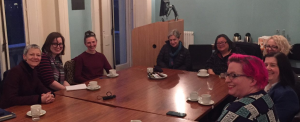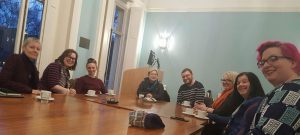Martin Paul Eve on talking disability activism with Naomi Lawson Jacobs and Judith Butler
Professor Martin Paul Eve on talking disability activism with Naomi Lawson Jacobs and Judith Butler
I have spent much of this week thinking about disability activism. I was spurred to this by Naomi Lawson Jacobs who was excluded this week from attending a lecture by Judith Butler at UCL because she uses a mobility scooter. At late notice, the talk was moved to a larger lecture theatre so that more people could attend. However, the new venue was not accessible.
I signed Jacobs’ open letter and suggested that she write to Judith Butler. Between us, we agreed that I would write and copy Naomi Jacobs in. To my great surprise, Butler replied almost immediately saying she was appalled and that she was trying to get the venue changed. When this proved impossible at the last minute, Butler instead made a statement at the start of her talk noting that she felt that this was probably illegal under the Equalities Act 2010 and offered to meet with those affected.
And so, on Friday afternoon, a small group of us met with Judith at Birkbeck, in the School of Arts, to talk about disability activism, ongoing discrimination in universities, and what can be done.

Judith Butler visits the School of Arts at Birkbeck
By way of background, it is worth quickly laying out the social model of disability, since that is what makes “disability activism” possible. In such thinking, there is a difference between a person’s impairment(s) and his, her, or their disability. Impairment refers to the ways in which the person’s body is different from the “norm”. For instance, my body’s immune system attacks the joints and vascular system in ways that are not typical for most people. This is my impairment and it causes me substantial pain, fatigue, and, from time to time, mobility difficulties. It also caused me to have a stroke last year. Disability refers to the modes of social organisation that make it difficult for people with impairments (read: different bodies) to participate fully in society. My degree of disability varies as my impairment fluctuates in severity but, for example, when I require mobility aids it is much harder for me to use various facilities that are not, for example, equipped with lifts.
Others may have different takes on the meeting itself, but my thoughts about our conversations with Judith Butler are as follows. I was struck, time and time again, by the personal narratives of additional labour that is put onto people who are disabled. For instance, where there are support funds for transport, the forms that people have to fill in take an age. It is a crushing burden of bureaucracy.
Participants also noted the problems of “making a fuss” at the lower end of a career ladder and we spoke about the parallels with Sara Ahmed’s coining of the “feminist killjoy”. We heard of an instance where an individual was told that she could not use the library because she was a “fire hazard”. That is, a person was described as a fire hazard.
We also discussed how government cuts have displaced the responsibility for helping reconfigure society to be enabling onto individuals (who are themselves over-worked) and away from the state. Indeed, the UN condemned the UK government last year for committing grave violations against the rights of disabled people. So, without demeaning their worthwhile fight, when people have protested recently, saying “first they came for the Muslims” (appropriating Martin Niemöller’s lines), we might consider that, actually, first they came for the disabled. As Judith Butler put it, “it’s clear you’ve developed an ironic sense of humour to deal with this but everything you’ve told me about is appalling”.
What is to be done? The problem with this question is that the burden of the “doing” so often falls on those who are already being held back by society and makes it work that they must take on, atop the struggle of any internal fatigue from impairment, and in addition to trying to stay afloat. In other words: to fight every battle leads to a situation where there is no time or energy left to do the original thing. It would be the life’s work of those with disabilities if they pursued every case. Another full-time job.
In this particular case, there were some things that we thought could be done, though:
- Whether you are disabled or not, make clear with every speaking invitation you send that you will not speak unless the venue is accessible (mobility, sensory impairments, autism-spectrum friendly).
- We could pursue legal cases if there are lawyers who would work pro bono on these matters. Making the liability financial and legal rather than just “bad publicity” would be a good way to focus minds. But again: who will do the work here? More labour and stress for those whose time is already being limited.
- Whether you are disabled or not, consider what processes you have in place to make adjustments but also consider: do these processes themselves entail more administrative work for the recipient? (i.e. are there forms to fill out to reclaim for travel expenses?) If there is more work, then it is not helpful.
- If you are not disabled, do not attend events from which others are excluded. Make this public and voice your solidarity.
- Having networks to distribute the labour of activism can help and there are many excellent groups already, such as the Sisters of Frida. But the work remains always too much and there is a systemic “individualisation” that makes every fight personal. Divide and conquer.
Disability activism is hard work and I was very grateful to Judith Butler for coming to listen and to lend her support (and she has done some work around disability before). Allies can help but they should not speak on behalf of others and I do not presume to do so here. But remember: nothing about us, without us.
Ultimately, the question becomes as follows, though. Whenever you plan something, organise an event, schedule a social outing, whatever it might be: which are the bodies that matter to you? And what will you do to accommodate those outside of the “norm”?
by Professor Martin Eve, February 2017
Photo credits: Eleanor Lisney and Martin Paul Eve
Thanks for making this discussion public
Hej!Det blir så på sommaren, man hinner inte sitta vid datorn. Ser att du har det bra och det är det vigktkaste.Önsiar dig en fin helg.Kram